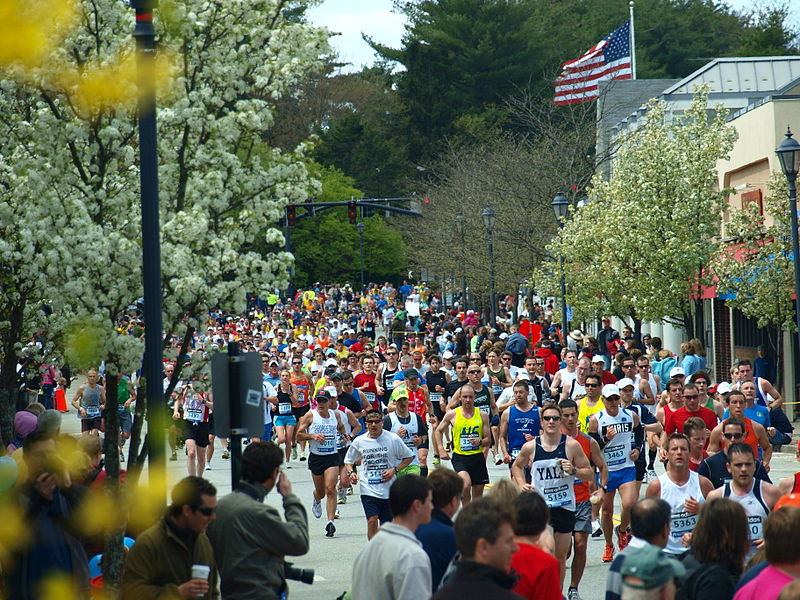The 121st Boston Marathon has come and gone, and once again temperatures rose above normal, a perennial concern for runners hoping to hit fast times in this historic Patriot’s Day race.
When the gun went off for the elite women’s race at 9:30 a.m. ET, it was 70 degrees Fahrenheit, and by the time the winner crossed the finish line on Boylston Street 2 hours 21 minutes and 52 seconds later, the mercury had creeped into the low 70’s. The average high for Boston in April is 56 degrees F.
Scientific studies have shown that ideal marathon racing conditions range between roughly 40 and 45 degrees F. Warmer weather and higher humidity makes it more physiologically difficult to maintain a consistent pace.
But this year was not an aberration. Last year’s starting temperature was also high, hitting 71 degrees F. The 2012 race began at 65 degrees and 2015 at 61. And as scientists have pointed out, high temperatures could be the new normal for this famous race, meaning its days of breaking running records could become much rarer.
Hotter Temps, Slower Races
In a 2012 study published in the journal PLOS ONE, researchers at Boston University pointed to Boston’s overall rise in temperature of 1.6 degrees Celsius (2.9 degrees F) between 1933 and 2004. By 2100, the researchers concluded, depending on the degree of future warming, there was between a 64 and 95 percent chance of seeing a steady slowdown in Boston Marathon finishing times.
“Our analysis shows that winning times are, in fact, almost 2 minutes slower for every 10 degree F (5.6 degree C) increase in temperature,” wrote Boston University professor Richard Primack, the lead author of the study, in an article explaining its findings. “The main reason that the heat so often beats runners is its adverse effects on the human body’s capacity for regulating internal temperature. An eventual inability to control body heat by sweating alone leads to cramps, dehydration and heat exhaustion, and can sometimes even result in a runner’s death.”
Primack also explained the findings of potential temperature increases, in plain English, in his follow-up article on the study.
“Based on our model, if Boston temperatures were to continue to warm by 4.5 degrees F (2.8 degrees C) by the end of the century (a mid-range estimate for global warming), there will be a 64 percent chance that winning times will be slowed. If the average global warming is as high as 9.4 degrees F (5.8 degrees C) — a high-end model estimate of global warming — the probability of slower race times is as high as 95 percent,” he wrote. “In such a future climate, the Boston Marathon would often be run on days that were hot enough to slow runners down.”
And as Primack highlighted, the Boston Marathon serves as an apt metaphor for the future challenges of a hotter planet.
“Endurance running will be especially hard hit by the predicted warmer climate, but higher temperatures could have dire consequences for the future of all warm-weather outdoor activities, including construction and farm work, team and endurance sports, and physical fitness training,” he explained. “People will increasingly have to avoid physical exertion during hot summer weather or risk exhaustion and even serious medical problems.”
Boston Sea Level Rise
The topic of climate change did not arise during NBC Sports Network’s coverage of the Boston Marathon, but high temperatures were discussed often during the race’s four hours of coverage. The Boston Athletic Association (BAA), which hosts and organizes the marathon, does not mention climate change or global warming on its website either.
However, the City of Boston is a little more climate-savvy, acknowledging climate change is real and could put the coastal city under water due to rising global sea levels from melting polar ice, according to its December 2016 report “Climate Ready Boston.”
That report predicts a worst-case scenario of over 10 feet in sea level rise by 2100, which would flood the campus of Harvard University and the tourist-heavy area around Boston Harbor. Under those conditions, it’s hard to imagine the current version of the Boston Marathon even being run. Then again, at that point, the City of Boston will have bigger concerns than whether or not runners can race up and down the Newton Hills.
“If seas rise that much, the New England coastline would look very different from space,” said one of the scientists who contributed to the report, pointing to its findings on worst-case scenarios. “There would be huge impacts on our ecosystems, and we would be talking about a managed retreat from the coastline rather than engineering a way to harden our coastline.”
Main image: The 2010 Boston Marathon. Credit: Peter Farlow , CC BY–SA 3.0
Subscribe to our newsletter
Stay up to date with DeSmog news and alerts







